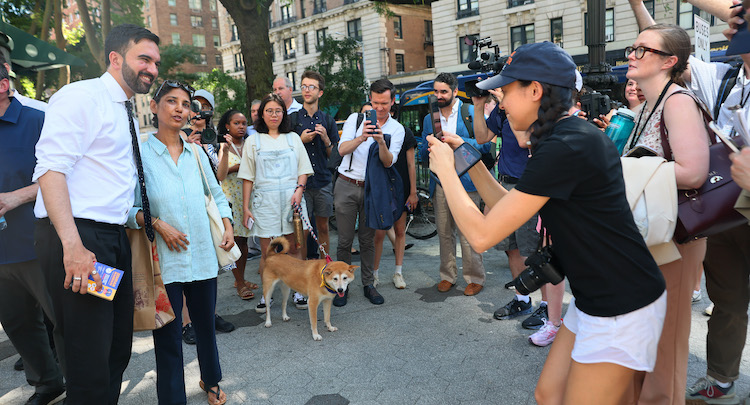Years ago I stopped in to a Dunkin’ Donuts on the West Side of Manhattan to grab breakfast. I had never been to this specific one before so I didn’t realize that although it was certified kosher, that certification only applied to half the menu. (It has to do with how the food is cooked before it’s delivered to the various branches.) I ordered something off the wrong half of the menu. The Southeast Asian woman behind the counter saw my yarmulke and said: “Sorry sir, that’s not kosher.”
It made for a classic only-in-New-York scene, the two of us standing there, me having been reproached for my kashrut carelessness by a non-Jewish proprietor whose job requires a certain level of halakhic fluency.
There are two elections today in New York City, and both of them have the potential to undermine Jews’ sense of their place in the most Jewish metropolis outside of the State of Israel. The ways that daily life in New York reflect that Jewishness seem minor but, like the Dunkin’ Donuts episode, they are common and they all add up to make Gotham feel like home, even for Jews who don’t live there.
One of the two elections is far more important than the other, to be sure. That would be the Democratic primary for mayor.
Polls suggest the race is a near-tossup between former Gov. Andrew Cuomo and socialist Zohran Mamdani. I wrote about Mamdani in May, noting that his anti-Zionism is his most defined characteristic. He surrounds himself with violence-promoting extremists and has worked a defense of Hezbollah into his campaign spiel (for certain audiences, at least). He is catastrophic, policy-wise, even without the vicious obsession with Israel and Jews, as committed snake-oil socialists often are. But throw in his defense of such phrases as “globalize the intifada” and you’ve got yourself an ostentatious foe of Jewish Americans’ safety and security.
But I want to go back to a word I chose with care: obsession. Mamdani has spent his entire adult life thinking about and organizing against the Jewish state. He has no organic reason for this besides hate. Everything, to Mamdani, comes down to the Jewish state. And what a Mamdani victory would do is mainstream and legitimize the idea that New Yorkers should always be thinking and talking about the evils of the Jewish state and what they can do and say to make 90 percent of Jews uncomfortable in public spaces.
It is this that represents such a danger to Jewish New Yorkers’ way of life: the obsession, the complete collapse of compartmentalization, the normalization of the idea that when you see a yarmulke you shouldn’t think “I should help this gentleman order off the kosher menu” but rather “is this guy a Zionist? He sure looks like a Zionist.”
Here’s an example. Last year, Sondra Shaievitz was campaigning for a spot on the board of directors of the Park Slope Food Coop outside the popular grocery. A man came over and, after noticing that Shaievitz is against BDS, the anti-Semitic campaign to ostracize Jews, stood over her for an hour yelling “She’s a Zionist!”
The Park Slope Food Coop is holding board elections again today. Will Brooklyn be the kind of place where Jews can expect to be yelled at and harassed for the crime of going food shopping? Although the coop matters far less than the mayor—it feels silly even writing that sentence, as if it needs to be said—the grocery is indicative of a cultural shift without which Zohran Mamdani wouldn’t be anywhere near Gracie Mansion.
The elections for the coop board are centered not on local issues or grocery matters but on Israel. That is one of two reasons they matter. The coop isn’t itself a powerful institution but rather a popular institution, with 17,000 members, and it is therefore testing how far into everyone’s private life this obsession with crushing Zionism can reach. And the anti-Zionist coop candidates are seeking to change the process by which coop policy votes are held all because they believe (with good reason) that altering the 50-year-old institution will make it easier to boycott—I kid you not—one type of bell pepper. It is the only Israeli product currently carried by the coop, and it is seasonal.
All this over a bell pepper? That’s what the vote will decide, whether an obsession with Jews will have wormed its way into every nook and cranny of daily life in parts of New York.
The other reason the coop election matters is demographics. As the Jewish Chronicle reported in November: “Once a predominantly Italian and Puerto Rican neighborhood, Park Slope is now made up of progressive financial leaders, journalists and authors.” And that, shoppers explained to the Chronicle, has made it a place where people are terrible: “In the past, according to Amy Sennesh Vastola, who has shopped at the co-op for 35 years, ‘people were very friendly.’ It was a great place to bring kids. ‘I don’t think anybody was doing their big social justice signaling,’ she says. ‘They would have been hypocrites if they did because they’re buying up all these brown stones and pushing people out.’ In 2019, the co-op had $58.3 million in sales. Wealth ‘always divorces you from reality.’”
What a wonderful trend. Progressives with money buy out communal institutions and turn them into hyper-political anti-Zionist hubs of harassment over a seasonal bell pepper.
We’ll soon find out if they can do the same to the rest of the city.

















